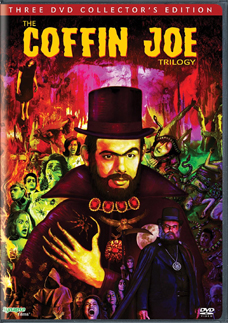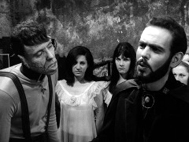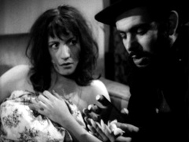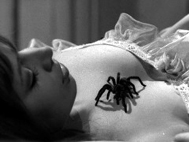 AT
MIDNIGHT I'LL TAKE YOUR SOUL (1964)/THIS NIGHT
I WILL POSSESS YOUR CORPSE (1967)
AT
MIDNIGHT I'LL TAKE YOUR SOUL (1964)/THIS NIGHT
I WILL POSSESS YOUR CORPSE (1967)Director: José Mojica Marins
Synapse Films
 AT
MIDNIGHT I'LL TAKE YOUR SOUL (1964)/THIS NIGHT
I WILL POSSESS YOUR CORPSE (1967)
AT
MIDNIGHT I'LL TAKE YOUR SOUL (1964)/THIS NIGHT
I WILL POSSESS YOUR CORPSE (1967)Zé do Caixão – known to us Yanks as "Coffin Joe" – is back on DVD from Synapse films in his first two efforts AT MIDNIGHT I'LL TAKE YOUR SOUL and THIS NIGHT I WILL POSSESS YOUR CORPSE.

In AT MIDNIGHT I'LL TAKE YOUR SOUL, dapper Zé do Caixão (Marins) is his village's man about town as well as its resident gravedigger. Mentally superior to his superstitious neighbors, Zé fears neither God nor Satan (mocking the village's faith by demanding meat on Good Friday). He believes only in the "continuity of blood" but is thwarted in his goals by barren but loving wife Lenita (Valéria Vasquez). Lighting upon Terezinha (Magda Mei), the innocent fiancée of his best friend Antônio (Nivaldo Lima, THE STRANGE WORLD OF COFFIN JOE), Zé believes he has found the perfect mate. Zé decides to murder his wife by setting a spider loose in her bed. Although there are suspicions about Zé, local Dr. Rodolfo (Ilídio Martins Simões) can only rule his wife's death as accidental, leaving an emboldened Zé to bully the locals (stabbing a fellow poker player in the hand when he accuses Zé of cheating and whipping a man who takes exception to Zé flirting with his niece). When Zé accompanies Antônio and Terezinha to visit a local gypsy, she warns the couple that they will not get married and Antônio will die soon. Zé murders Antonio and forces himself on Terezinha who threatens to kill herself so that she can come back and take his soul. When Terezinha hangs herself, Zé is shaken because she had the courage to kill herself and did not blame him in her suicide note. Zé is assailed by increasingly nightmarish hallucinations or ghostly recriminations from Terezinha, Antônio, and Lenita as the Day of the Dead nears.
 A
direct sequel to AT MIDNIGHT I'LL TAKE YOUR SOUL, THIS NIGHT I'LL POSSESS YOUR
CORPSE finds Zé recovering from his ordeal and finding himself a free
man as the court rules that there is insufficient evidence to prosecute him
for murder. Returning to his home village, Zé renews his quest to have
a child with the help of his hunchbacked assistant Bruno (Jose Lobo). Abducting
six Godless women, he tests their courage by unleashing live tarantulas on them
while they are sleeping. The only woman who does not show fear is socialite
Marcia (Nadia Freitas) while the others are consigned to the snake pit, with
dying Jahira curses Zé and with the titular boast and swears that he
will never attain his goal. When Marcia refuses him, he sets her free knowing
that her love for him is a weakness that will prevent her from turning him in.
Zé sets his sights on the Colonel's daughter Laura (Tina Wohlers) who
is "a different kind of woman." When the Colonel, his son, and local
tough Truncador attempt to thwart their union, Zé turns the tables on
them diabolically with the help of Bruno and Marcia. When Zé learns that
Jahira was pregnant and that he has thus murdered a child, he has a nightmare
in which he is dragged down to hell. When he wakes up, he learns that Laura
is pregnant with his child.
A
direct sequel to AT MIDNIGHT I'LL TAKE YOUR SOUL, THIS NIGHT I'LL POSSESS YOUR
CORPSE finds Zé recovering from his ordeal and finding himself a free
man as the court rules that there is insufficient evidence to prosecute him
for murder. Returning to his home village, Zé renews his quest to have
a child with the help of his hunchbacked assistant Bruno (Jose Lobo). Abducting
six Godless women, he tests their courage by unleashing live tarantulas on them
while they are sleeping. The only woman who does not show fear is socialite
Marcia (Nadia Freitas) while the others are consigned to the snake pit, with
dying Jahira curses Zé and with the titular boast and swears that he
will never attain his goal. When Marcia refuses him, he sets her free knowing
that her love for him is a weakness that will prevent her from turning him in.
Zé sets his sights on the Colonel's daughter Laura (Tina Wohlers) who
is "a different kind of woman." When the Colonel, his son, and local
tough Truncador attempt to thwart their union, Zé turns the tables on
them diabolically with the help of Bruno and Marcia. When Zé learns that
Jahira was pregnant and that he has thus murdered a child, he has a nightmare
in which he is dragged down to hell. When he wakes up, he learns that Laura
is pregnant with his child.

While American audiences were long tantalized by images of Brazilian star/genre auteur José Mojica Marins striking poses in a top hat and cape with long fingernails, the garish posters for his films, and their outrageous titles in various horror film texts, the Zé do Caixão films were all but impossible to see until Something Weird Video made contact with Marins in the nineties and released a series of subtitled VHS cassettes of his works whereupon he was rechristened "Coffin Joe." Combining Sadean philosophy, fervent Christian faith, and a Carnival-esque approach to damnation, the first two entries of the Coffin Joe "trilogy" – not completed until 2008's EMBODIMENT OF EVIL – is crude and makeshift yet undeniably disturbing. The weaknesses in the writing and acting are offset by Marins' scenery-chewing, some makeshift gore, and the hit-and-miss photography of Giorgio Attili almost evokes Val Lewton's RKO horrors at their best and looks like an unrestored silent film the rest of the time. Animated titles and visual effects are crudely etched and glued to the celluloid (which may be partially why the materials for the films have not held up well over the years), and the library tracks include such bizarre choices as the Hallelujah chorus when Zé learns that Laura is with child. While AT MIDNIGHT is rather simplistic with Zé basically a boastful skeptic who gets his comeuppance, THIS NIGHT iterates Zé philosophy of "the continuity of blood" and that children are pure beings who become "lost in a labyrinth of egotism" when they grow up, and his belief that he is the savior of mankind by preventing his inferior victims (male and female) from producing more like them. The Hell sequence is not just full color, but a garish, candy-colored landscape of snow, heads and limbs sticking out of the ground and walls to be tormented by pitchforks, and immobilized victims who have spikes hammered into their foreheads. Although Marins presents Zé as an individualist, the first film seems to affirm the director's (or the censors') Catholic faith while the second paints him as an irredeemable madman who would rather martyr himself at the hands of a torch-wielding mob than embrace religion. Zé de Caxiao would weave himself in and out of Marin's subsequent genre filmography, presenting him as a fictional creation come to life to bedevil rational men (sometimes played by Marins himself as his possession film in EXORCISMO NEGRO). In the eighties, he would add softcore and hardcore pornography to his oeuvre which was just about to be rediscovered in other countries.
 With
the elements for Marins' films poorly archived and already looking quite ragged
by the time of the SWV cassettes, Synapse was unable to secure new high definition
masters and have had to rely on the digital masters struck circa 2001 for the
Fantoma DVD and the Brazilian Cinemagia nine-film boxed set (which featured
English subtitles). AT MIDNIGHT's progressive, non-anamorphic fullscreen DVD
encode looks a tad cleaner than it did before, although it still looks like
an unrestored film from the thirties more so than a sixties monochrome film
for the most part. The Dolby Digital 2.0 mono track is in fair condition while
the optional English subtitles sport a few oddities (Good Friday becomes "Holy
Friday") but no obvious errors. THIS CORPSE is just as variable with some
shots, with some shots looking soft (either through focus or registration) and
one character's checkered suit causing eyestrain, including the end quotation
which is so blurry that it is just as well that there is a subtitle translation.
With
the elements for Marins' films poorly archived and already looking quite ragged
by the time of the SWV cassettes, Synapse was unable to secure new high definition
masters and have had to rely on the digital masters struck circa 2001 for the
Fantoma DVD and the Brazilian Cinemagia nine-film boxed set (which featured
English subtitles). AT MIDNIGHT's progressive, non-anamorphic fullscreen DVD
encode looks a tad cleaner than it did before, although it still looks like
an unrestored film from the thirties more so than a sixties monochrome film
for the most part. The Dolby Digital 2.0 mono track is in fair condition while
the optional English subtitles sport a few oddities (Good Friday becomes "Holy
Friday") but no obvious errors. THIS CORPSE is just as variable with some
shots, with some shots looking soft (either through focus or registration) and
one character's checkered suit causing eyestrain, including the end quotation
which is so blurry that it is just as well that there is a subtitle translation.

AT MIDNIGHT is playable with a melodramatic introduction by Coffin Joe (2:10) in the vein of the one by the gypsy witch that follows the opening credits, a "New Scene" (6:53) filmed in 2002 which is actually a reenactment of the sequence in which Zé beats and rapes Terezinha (here played by blonde Graciele Liborios) which seems even more melodramatic in sterile digital video. Besides the original theatrical trailer (1:50), the disc also includes a "Rare Promotional Trailer" (3:16) from a videotape source that is even more of a clip show than the trailer. Extras also carry over the Marins interview from the Fantoma disc as "The Making of AT MIDNIGHT I’LL TAKE YOUR SOUL" (10:01) in which he recalls being inspired to write the film by a dream in which he was dragged to be shown his tombstone and feared seeing the date of his death, deriving Zé's look from a top-hatted and caped doorman, the difficulty of casting the character before deciding to play him himself by adding a hat, cape, and long fingernails to his Sunday suit, Brazil's attitude at the time towards horror films, shooting with a professional crew with limited film stock, and the church's reaction to the film. Another interview featurette (8:53) has him discussing his 1952 short film "Reino Sangrento" set in the Amazon with over a hundred extras, makeshift period clothes, and shocking-for-the-time belly dancing. The film was screened without sound so Marins narrated while an actress did all of the screaming and moaning live. Another interview with Marins (6:31) finds him discussing how he first became attracted to cinema as a child watching a projectionist show Charlie Chaplin films and cartoons at the venue where his mother worked as a dancer.
 "The
Making of THIS NIGHT I'LL POSSESS YOUR CORPSE" featurette (8:12) in which
he discusses his preferences for working with amateur casts over professionals,
his unconventional methods of soliciting required reactions from the actors,
as well as choosing the hues for hell, using popcorn for snow, and how rough
that part of the shoot was for the actors. In "A Visit to the Coffin Joe
Museum" (4:25), Marins shows off the coffin constructed for AT MIDNIGHT,
his original costume, props (including one of his real fingernails resting on
a silk pillow), international awards, and photographs of him with local celebrities
and fellow horror stars like Christopher Lee. "The Universe of Mojica Marins"
(25:14) is a vintage television special that juxtaposes some of the grueling
moments from his films with an interview with his mother and Marins himself
who espouses that Zé is the first thoroughly Brazilian folkloric character.
Although the original subtitles are dodgy, the piece is most interesting in
reminding viewers that Zé, although an obscure figure of cult film elsewhere,
was a cultural phenomenon in his native Brazil (the narrator refers to Marins'
work as "terroreroticism" and "astonishing kitsch"), with
Marins making guest appearances in public and on television as both himself
and his character. An additional interview (7:48) finds Marins discussing how
he came up with Zé again, but this time prefaced with the discussion
of his first attempt at a feature in 1935 in which one actress accidentally
drowned, another died from tuberculosis, and a storm destroyed the sets. Also
included is a photos gallery (1:55), the film's trailer (2:16), and an optional
introduction by Marins (1:42). The two films are available separately or as
THE COFFIN JOE TRILOGY with Marin's 2008 Coffin Joe film EMBODIMENT OF EVIL
(which Synapse previously released on Blu-ray in 2011).
(Eric
Cotenas)
"The
Making of THIS NIGHT I'LL POSSESS YOUR CORPSE" featurette (8:12) in which
he discusses his preferences for working with amateur casts over professionals,
his unconventional methods of soliciting required reactions from the actors,
as well as choosing the hues for hell, using popcorn for snow, and how rough
that part of the shoot was for the actors. In "A Visit to the Coffin Joe
Museum" (4:25), Marins shows off the coffin constructed for AT MIDNIGHT,
his original costume, props (including one of his real fingernails resting on
a silk pillow), international awards, and photographs of him with local celebrities
and fellow horror stars like Christopher Lee. "The Universe of Mojica Marins"
(25:14) is a vintage television special that juxtaposes some of the grueling
moments from his films with an interview with his mother and Marins himself
who espouses that Zé is the first thoroughly Brazilian folkloric character.
Although the original subtitles are dodgy, the piece is most interesting in
reminding viewers that Zé, although an obscure figure of cult film elsewhere,
was a cultural phenomenon in his native Brazil (the narrator refers to Marins'
work as "terroreroticism" and "astonishing kitsch"), with
Marins making guest appearances in public and on television as both himself
and his character. An additional interview (7:48) finds Marins discussing how
he came up with Zé again, but this time prefaced with the discussion
of his first attempt at a feature in 1935 in which one actress accidentally
drowned, another died from tuberculosis, and a storm destroyed the sets. Also
included is a photos gallery (1:55), the film's trailer (2:16), and an optional
introduction by Marins (1:42). The two films are available separately or as
THE COFFIN JOE TRILOGY with Marin's 2008 Coffin Joe film EMBODIMENT OF EVIL
(which Synapse previously released on Blu-ray in 2011).
(Eric
Cotenas)